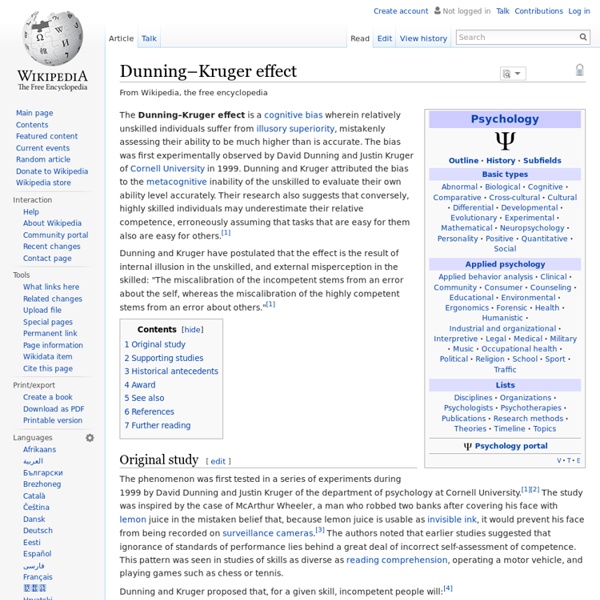Dunning–Kruger effect

http://en.wikipedia.org/wiki/Dunning%E2%80%93Kruger_effect
Peter Principle
An illustration visualizing the Peter principle The Peter Principle is a concept in management theory in which the selection of a candidate for a position is based on the candidate's performance in his or her current role rather than on abilities relevant to the intended role. Thus, employees only stop being promoted once they can no longer perform effectively, and "managers rise to the level of their incompetence." The principle is named after Laurence J.
Top 10 Things That Determine Happiness
photo: meddygarnet Happiness is, by nature, a subjective quality with a definition like a moving target. There is scant evidence — qualitative or quantitative — to lend convincing support to those life variables most critical in determining individual happiness, which is likely why past researchers committed to the scientific method rarely tried to tackle the subject. This is changing.
Top 10 Thinking Traps Exposed
Our minds set up many traps for us. Unless we’re aware of them, these traps can seriously hinder our ability to think rationally, leading us to bad reasoning and making stupid decisions. Features of our minds that are meant to help us may, eventually, get us into trouble. Here are the first 5 of the most harmful of these traps and how to avoid each one of them.
Welcome to Adobe GoLive 6
From Los Angeles Times: It's not all about you Chances are, others aren't judging you as harshly as you think, if at all. By Benedict Carey Times Staff Writer January 13, 2003
15 styles of Distorted Thinking
15 styles of Distorted Thinking Filtering: You take the negative details and magnify them while filtering out all positive aspects of a situation. Polarized Thinking: Things are black or white, good or bad. You have to be perfect or you're a failure. There is no middle ground. Overgeneralization: You come to a general conclusion based on a single incident or piece of evidence.
Ten Psychology Studies from 2009 Worth Knowing About - David DiSalvo - Brainspin
Image by AFP/Getty Images via Daylife Several great psychology and neuroscience studies were published in 2009. Below I’ve chosen 10 that I think are among the most noteworthy, not just because they’re interesting, but useful as well. 1. If you have to choose between buying something or spending the money on a memorable experience, go with the experience.
Color Psychology
by David Johnson Like death and taxes, there is no escaping color. It is ubiquitous. Yet what does it all mean?
The Forer Effect
The Forer effect is a term used to describe the tendency of people to interpret general statements as being accurate for them personally, even when they are not. Specifically, when people are given a random personality assessment and told it has been written for them personally, they will tend to rate it as highly accurate. The term is named after American psychologist Bertram R. Forer (1914-2000), who conducted an experiment in 1948. Forer gave a personality test to a group of students, then asked them to rate the test results for accuracy (i.e. how well the test results described their unique personality). Students rated their results on average at 85.2% accurate.
Related:
Related:



